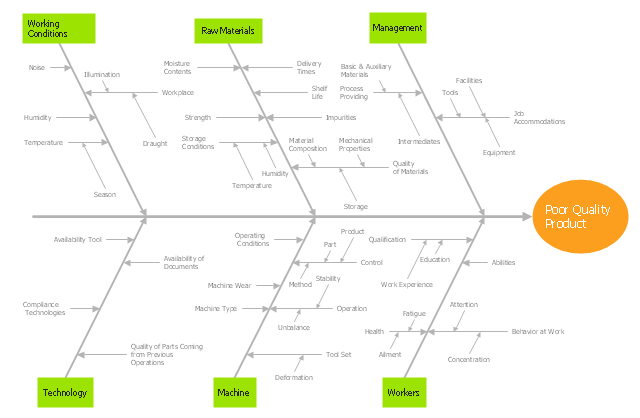Total Quality Management Value
The Total quality management (TQM) is an enterprise-wide method of continuous quality improvement of all organizational processes, including the enhancement of ability to deliver high-quality products and services to the customers. The TQM includes eight main elements, which have great value: customer-focused, process-centered, total employee involvement, integrated system, continual improvement, strategic and systematic approach, fact-based decision making, communications. ConceptDraw PRO diagramming and vector drawing software offers the Total Quality Management Diagram solution with effective drawing tools, predesigned vector elements, samples and templates that help easy design the Total Quality Management diagrams, TQM flowcharts and Mind Maps widely used in quality management projects to visualize the business processes and industrial processes for your organization, to demonstrate the quality control step-by-step in a visual manner, to compare visually the ideal and real stages of processes."Ishikawa diagrams (also called fishbone diagrams, herringbone diagrams, cause-and-effect diagrams, or Fishikawa) are causal diagrams created by Kaoru Ishikawa (1968) that show the causes of a specific event. Common uses of the Ishikawa diagram are product design and quality defect prevention, to identify potential factors causing an overall effect. Each cause or reason for imperfection is a source of variation. Causes are usually grouped into major categories to identify these sources of variation. The categories typically include:
- People: Anyone involved with the process
- Methods: How the process is performed and the specific requirements for doing it, such as policies, procedures, rules, regulations and laws
- Machines: Any equipment, computers, tools, etc. required to accomplish the job
- Materials: Raw materials, parts, pens, paper, etc. used to produce the final product
- Measurements: Data generated from the process that are used to evaluate its quality
- Environment: The conditions, such as location, time, temperature, and culture in which the process operates" [Ishikawa diagram. Wikipedia]
The fishbone diagram example "Causes of low-quality output" was created using the ConceptDraw PRO diagramming and vector drawing software extended with the Fishbone Diagrams solution from the Management area of ConceptDraw Solution Park.
- People: Anyone involved with the process
- Methods: How the process is performed and the specific requirements for doing it, such as policies, procedures, rules, regulations and laws
- Machines: Any equipment, computers, tools, etc. required to accomplish the job
- Materials: Raw materials, parts, pens, paper, etc. used to produce the final product
- Measurements: Data generated from the process that are used to evaluate its quality
- Environment: The conditions, such as location, time, temperature, and culture in which the process operates" [Ishikawa diagram. Wikipedia]
The fishbone diagram example "Causes of low-quality output" was created using the ConceptDraw PRO diagramming and vector drawing software extended with the Fishbone Diagrams solution from the Management area of ConceptDraw Solution Park.
- Fishbone Diagram | Business Productivity Diagramming | Cause ...
- Fishbone Diagram | Cause and Effect Analysis (Fishbone Diagrams ...
- Fishbone diagram - Causes of low-quality output - Conceptdraw.com
- Fishbone Diagram | Business Productivity Diagramming | Fishbone ...
- Business Productivity Diagramming | Fishbone Diagram | Ishikawa ...
- Fishbone Diagram | Fishbone diagram - Causes of low-quality ...
- Fishbone Diagram | Quality fishbone diagram template | Fishbone ...
- Fishbone Diagram | Fishbone diagram - Causes of low-quality output |
- Fishbone Diagram | Management | Fishbone diagram - Causes of ...
- Fishbone Diagram | Business Productivity Diagramming | Business ...
- Ishikawa diagram - Factors reducing competitiveness | Business ...
- Design elements - Fishbone diagram | Fishbone diagram - Causes ...
- Fishbone diagram - Causes of low-quality output | Design elements ...
- Cause and Effect Analysis (Fishbone Diagrams ) | Business ...
- Cause and Effect Analysis (Fishbone Diagrams )
- Cause and Effect Analysis (Fishbone Diagrams ) | PROBLEM ...
- Fishbone Diagram | Business Productivity Diagramming | Use a ...
- Fishbone Diagram Software for Design | Design elements ...
- Fishbone Diagram | Management | Business Productivity ...
- Total Quality Management with ConceptDraw | Business Productivity ...

